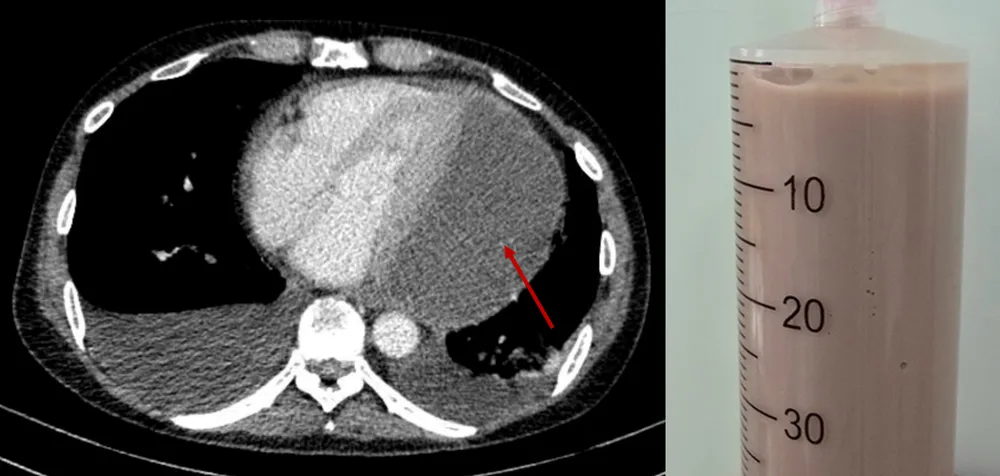Confirmatory chest CT scan with red arrow showing purulent pericardial tamponade and thick purulent fluid drained by pericardiocentesis
Previously, the patient had chest pain, fatigue and difficulty breathing that gradually increased over the 2 months before being admitted to the hospital. He had been examined in many places but the exact disease was not detected and treatment did not improve. With a history of long-term alcoholism, cirrhosis and newly discovered diabetes, the patient's health was increasingly deteriorating.
According to Dr. Duong Van Muoi Mot, Head of the Department of Cardiothoracic Surgery - Vascular Surgery, People's Hospital 115, the patient was admitted in a state of general exhaustion, had to breathe high doses of oxygen, had low blood pressure and a very fast pulse, and was edematous all over the body. Through ultrasound, doctors discovered a large mass of fluid nearly 11cm surrounding the heart - the cause of the heart being squeezed, having difficulty contracting and threatening the patient's life.
Faced with the critical situation, experts from the departments of cardiology, cardiac surgery, diagnostic imaging, respiratory medicine, and internal medicine discussed and decided to intervene to urgently aspirate pus from the pericardium. “This is a difficult aspiration and has many potential risks because the pus is located in a difficult-to-reach location and the fluid is thick. However, thanks to professional experience and the support of modern ultrasound equipment at the hospital bed, the doctors successfully aspirated 500ml of thick pus, quickly reducing pressure on the heart,” informed Dr. Duong Van Muoi Mot.
According to Dr. Duong Van Muoi Mot, the test results showed that this was a case of severe purulent pericarditis, not caused by tuberculosis or parasites. The patient underwent surgery to open a pericardial window to continue draining all remaining pus. At the same time, he was actively treated with strong antibiotics, strictly treated the underlying disease, and supported his physical condition...
After 2 weeks of treatment, the patient recovered spectacularly: no more chest pain or shortness of breath, eating well, moving normally. An echocardiogram showed that the fluid around the heart had disappeared. Underlying diseases such as cirrhosis and diabetes were also stably controlled.
Empyema pericarditis is a serious infection that is relatively rare due to widespread use of antibiotics worldwide (reported to occur in 1 in 18,000 people worldwide ). It is characterized by a buildup of pus in the pericardial cavity (the membrane that surrounds the heart). If not diagnosed and treated promptly, this condition can be life-threatening.
Accumulated pus can spread into the bloodstream, causing severe systemic infection, compressing the heart, obstructing blood circulation, leading to low blood pressure, shock, and even sudden cardiac arrest leading to death. People with weak immune systems, chronic diseases (such as cirrhosis, diabetes, cancer, etc.) or alcoholism are at higher risk. Symptoms are often unclear: chest pain, fatigue, mild shortness of breath, so they are easily overlooked. Treatment requires close coordination between specialists and emergency intervention to drain pus, use strong antibiotics, and surgery if necessary.
In Vietnam, cases of pericardial effusion in adults are very rare and there have not been many reports of similar cases.
THANH SON
Source: https://www.sggp.org.vn/cuu-song-benh-nhan-tran-mu-mang-ngoai-tim-hiem-gap-post798252.html





























![[Photo] General Secretary To Lam receives Korean Ambassador to Vietnam](https://vphoto.vietnam.vn/thumb/1200x675/vietnam/resource/IMAGE/2025/6/6/a0765b7543784cbcbfe4755b67d43ab4)
![[Photo] President Luong Cuong works with Hung Yen and Thai Binh Provincial Party Committees on implementing Resolution of the 11th Central Conference, 13th tenure](https://vphoto.vietnam.vn/thumb/1200x675/vietnam/resource/IMAGE/2025/6/6/127b735d2761484d81dcee0d7725a25b)


























































![[OCOP REVIEW] Tu Duyen Syrup - The essence of herbs from the mountains and forests of Nhu Thanh](https://vphoto.vietnam.vn/thumb/402x226/vietnam/resource/IMAGE/2025/6/5/58ca32fce4ec44039e444fbfae7e75ec)











Comment (0)